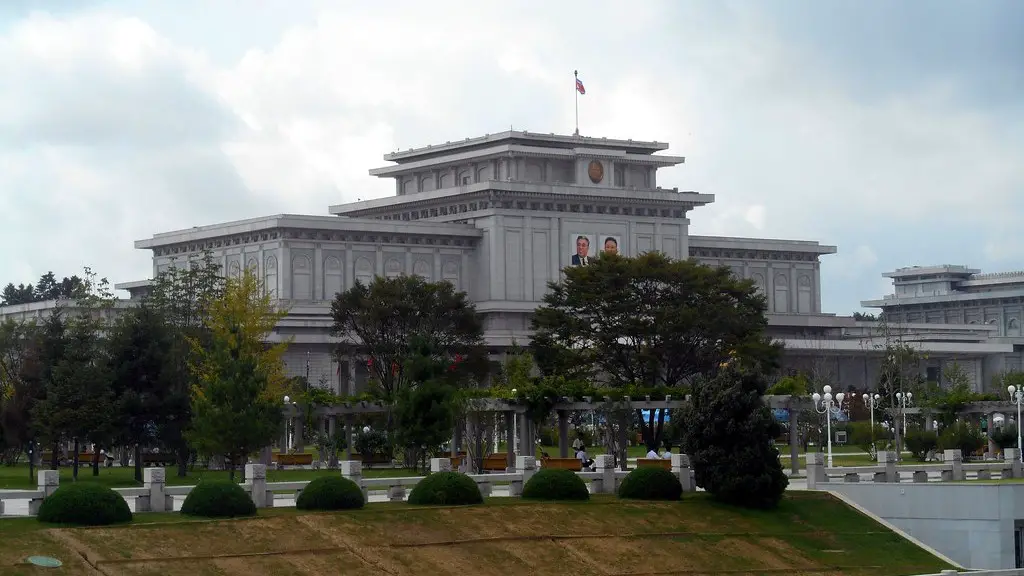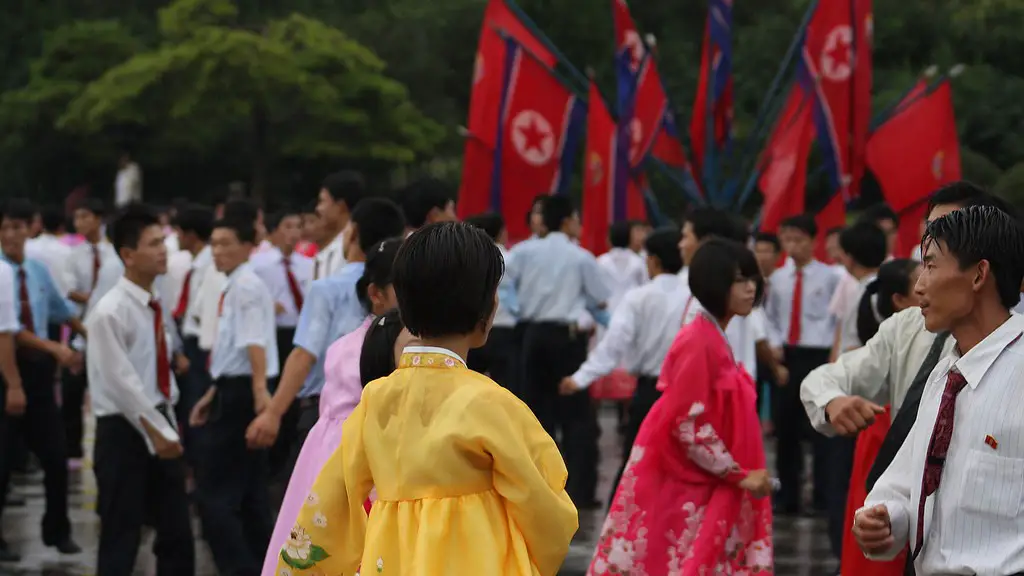The US and North Korea have long been at loggerheads, giving rise to much speculation about a possible US invasion of North Korea. In recent months, tensions between the two countries have escalated, leading to talk about a possible invasion by the US military. Many analysts have spoken out on the issue, with opinions ranging from caution to apocalyptic scenarios.
The debate largely centers on two issues. The first is the security environment on the Korean Peninsula. North Korea has conducted nuclear and missile tests in the past, prompting the international community to impose ever-tighter sanctions on the country. US President Donald Trump has also adopted a hard line towards North Korea, raising fears of a possible conflict. The second issue is the US’s capabilities. With its powerful military, the US is seen as a potential contender for North Korea, despite the latter’s formidable armed forces.
Supporters of an invasion point to the US’s well-documented history of invasions and military interventions. They argue that the US has a long history of using its military power to achieve its political objectives, and that it could use an invasion of North Korea as a means of achieving its goals. They point to the success of past US invasions, such as Iraq and Afghanistan, as evidence that the US could succeed in an invasion of North Korea.
In contrast, opponents of an invasion argue that an invasion of North Korea would be a mistake. They point to the fact that North Korea is a nuclear-armed state and that any military action against it could trigger a potentially catastrophic conflict in the region. They also point to the fact that North Korea has powerful allies, such as China and Russia, which could come to its aid in the event of a US invasion. In addition, these opponents argue that any US military action against North Korea would likely be met with fierce resistance from North Korean troops, who would be well-prepared for an engagement.
Experts in international relations have also weighed in on the issue. Most agree that an invasion of North Korea by the US is unlikely to be successful and could even lead to a catastrophic conflict. The consensus among these experts is that the US should use diplomacy, rather than military force, to resolve its differences with North Korea.
Overall, it is clear that the prospect of a US invasion of North Korea is one that should not be taken lightly. There is much at stake both for the US and for the region, and a misstep could lead to devastating consequences. While the US has a powerful military, it should not be the default solution to disputes and should instead be used only as a last resort.
What is The US Military’s Capability?
The US is one of the most powerful military forces globally. It is arguably the most heavily-armed state in the world, with a vast array of military equipment and technology at its disposal. These include advanced fighter jets, warships, and nuclear weapons. The US also has access to a large number of military personnel, equipped with the latest in battlefield technology, such as precision-guided munitions and intelligence technology. The US is thus seen as a potential contender for North Korea, despite the latter’s formidable armed forces.
Nevertheless, military experts point out that the US military is not a panacea. While its armed forces are powerful, they can be easily outmaneuvered by an adversary that is armed with modern warfare tactics. Additionally, an invasion of North Korea could potentially provoke a powerful response from other countries in the region, such as China, Russia, and Japan. Thus, any invasion by the US military would have to take into account the risk of a regional war breaking out.
Finally, it must be remembered that the US military is not infallible. It has suffered a number of costly defeats in recent years, such as in Iraq and Afghanistan, which highlight its limitations. Thus, if the US were to consider invading North Korea, it would have to seriously consider the potential costs and risks involved.
What Would Be The US Objective?
It remains unclear what the US’s objectives would be if it were to invade North Korea. Some point to the need for regime change, as a means of curtailing North Korea’s nuclear ambitions. Others argue that the US may be motivated by a desire to secure its own interests in the region, such as access to mineral resources, or to protect its allies from the threats posed by North Korea.
The objectives of an invasion may also depend on what the US is willing to risk. An invasion may be limited in scope, such as a limited air strike against nuclear sites, or it may be more aggressive and involve a ground invasion. Any invasion would also require the backing of the UN Security Council, which is unlikely to grant permission given the international community’s stance on the use of military force.
Whatever the US’s objectives, they are certain to be controversial. An invasion of North Korea would mark a significant change from the US’s current policy of sanctions and diplomacy, and would be seen by some as a dangerous escalatory action. It would also risk provoking North Korea’s allies, such as China and Russia, or a response from non-state actors, such as North Korea’s hacker networks.
Effects of A US Invasion
If the US were to launch an invasion of North Korea, the effects would be far-reaching. The immediate consequences would be felt in the region and beyond, as the full force of the US military would be unleashed on North Korea. The US would face the prospect of a costly and long-term military engagement with a powerful but fortified state and the risk of a nuclear conflict.
Meanwhile, the international response would be mixed. Some countries may support the US’s actions, seeing a US invasion as a necessary step to contain North Korea’s growing nuclear program. Others, however, may oppose the move, arguing that a unilateral military action would be a violation of international law and could have damaging long-term implications for regional stability.
The long-term effects of a US invasion would be even more complicated. The US would inevitably face the task of reconstructing and stabilizing North Korea after a successful invasion. This could take years, and would require significant amounts of money and resources. Additionally, the US would have to contend with the political fallout of the invasion, as its actions would be seen as an unwelcome foreign intervention in the affairs of a sovereign state.
Would The UN Approve?
If the US were to consider an invasion of North Korea, it would almost certainly seek the backing of the UN Security Council. This is because the use of military force is prohibited under international law, unless it is authorized by the UN. However, it is widely believed that the UN Security Council would not approve an invasion of North Korea, given the potential risks and implications.
The US could try to make its case for a UN-authorized invasion of North Korea, but it is unlikely to succeed. This is because such an action would be seen as a violation of international law, and any authorization from the UN Security Council would be likely to be strongly opposed. Additionally, even if the US were to succeed in obtaining a positive vote from the Council, it is unclear what practical impact it would have on its ability to launch an invasion.
It is thus clear that an invasion of North Korea is an unlikely proposition. While the US has the military capabilities to do so, it is highly unlikely that it will gain the necessary authorization from the UN Security Council. This is because an invasion would be seen as a violation of international law and could have far-reaching implications for regional stability.
How Would The Region React?
The regional response to a US invasion of North Korea would depend on a number of factors, such as which states the US chose to engage militarily and the nature of the US’s operations. It is likely, however, that a US invasion of North Korea would provoke a reaction from the region’s major powers, such as China, Russia and Japan.
First, China is likely to oppose any US move against North Korea, as it is North Korea’s closest ally and has an interest in maintaining stability in the region. China is also likely to be concerned about the implications of a US invasion for its own security. Second, Russia is likely to oppose a US invasion of North Korea, as it would represent an unwelcome intrusion into its own political interests and could further destabilize the region. Finally, Japan is likely to be strongly opposed to a US invasion of North Korea, as it could potentially undermine the relative peace that currently exists between the two countries.
In general, it is likely that a US invasion of North Korea would garner a great deal of opposition from the region’s major powers. This could lead to an increased risk of conflict in the region, as these powers scramble to protect their interests. Additionally, it could lead to greater instability, as the nature and scope of any US operations remain uncertain.
What Would Be The Potential Cost?
If the US were to consider an invasion of North Korea, it would have to seriously consider the potential costs. An invasion would represent a significant drain of resources for the US, both in terms of money and personnel. The US would also likely suffer casualties in the event of a conflict, a fact that would not be lost on the US public.
In addition to the direct costs of a US invasion, there would also be indirect costs. These include the potential for the US to be drawn into a longer and more costly conflict than originally planned and the risk of severe economic sanctions being imposed on the US. Moreover, a US invasion of North Korea could also have an impact on the regional balance of power, as the presence of US forces in the region could lead to a shift in the geopolitical dynamics.
Overall, it is clear that any US invasion of North Korea would come with a hefty price tag. The US would be responsible for a significant financial cost and could incur further costs in terms of casualties and regional stability. Thus, the potential costs of an invasion must be carefully weighed against its potential benefits.





